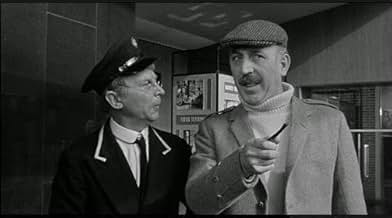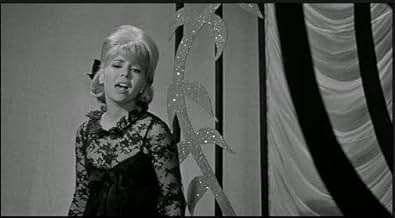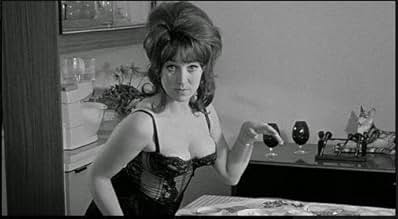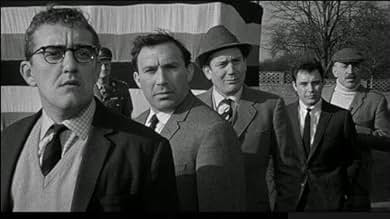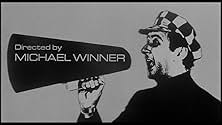A motley group of soldiers are set loose in swinging London in an initiative test to collect a selection of esoteric items.A motley group of soldiers are set loose in swinging London in an initiative test to collect a selection of esoteric items.A motley group of soldiers are set loose in swinging London in an initiative test to collect a selection of esoteric items.
- Director
- Writers
- Stars
Wilfrid Hyde-White
- General Lockwood
- (as Wilfrid Hyde White)
- Director
- Writers
- All cast & crew
- Production, box office & more at IMDbPro
5.9413
1
2
3
4
5
6
7
8
9
10
Featured reviews
It Reeks Of The 1960's And A Bygone Era
The film begins with the superb opening credits by Bob Godfrey, and a Mona Lisa start which is not unlike (and predates) Terry Gilliam, and sets one up for a light hearted typical British affair. It frequently uses the streets of London as a backdrop and is filled with some marvellous cameo roles by numerous character actors. They seem to be all here.
There are quite a few memorable roles but accolades go to Terry Thomas, Lionel Jeffries (that's a first for me), and Denholm Elliot glides through his performance with aplomb. Of course the plot is ridiculous, and the film is not a gem, but I was delighted to catch this film. I even laughed during the film. There's a little bit of 60's saucyness, pop references (The Cavemen), sending up of the upper classes, the obligatory (largely unknown) Amercan actor and cuts that are pure 1960's.
It's not a Carry On film, it's much better, and if you like black & white British 1960's movies and the (now lost) actors from then, you will not be disappointed.
There are quite a few memorable roles but accolades go to Terry Thomas, Lionel Jeffries (that's a first for me), and Denholm Elliot glides through his performance with aplomb. Of course the plot is ridiculous, and the film is not a gem, but I was delighted to catch this film. I even laughed during the film. There's a little bit of 60's saucyness, pop references (The Cavemen), sending up of the upper classes, the obligatory (largely unknown) Amercan actor and cuts that are pure 1960's.
It's not a Carry On film, it's much better, and if you like black & white British 1960's movies and the (now lost) actors from then, you will not be disappointed.
An undervalued pleasure
It's somewhat strange how this cheery and pleasing film has been almost totally forgotten today - perhaps in part despite its 'Swinging London' ethos that it was filmed in black & white?
Michael Winner's 1960s films were noted for their vivid and lively style, and it's a pity that when he moved to Hollywood in the early 1970s he seemed to lose that style and his films became defined by being dour, downbeat and often quite nasty.
Back to YMBJ, acting standouts include Lionel Jeffries who steals the film with his funny performance just as he did a few years previously with 'The Wrong Arm of the Law' and Terry-Thomas in a small but typically very amusing performance.
The film's finale is a bit messy and incoherent, but otherwise the film is full of good fun and laughs.
Michael Winner's 1960s films were noted for their vivid and lively style, and it's a pity that when he moved to Hollywood in the early 1970s he seemed to lose that style and his films became defined by being dour, downbeat and often quite nasty.
Back to YMBJ, acting standouts include Lionel Jeffries who steals the film with his funny performance just as he did a few years previously with 'The Wrong Arm of the Law' and Terry-Thomas in a small but typically very amusing performance.
The film's finale is a bit messy and incoherent, but otherwise the film is full of good fun and laughs.
woeful
"you must be joking!",the title says it all.more like you cannot seriously think this woeful rubbish is the slightest bit amusing.just goes to show that once again,a non-stop barrage of star cameos does not compensate for lack of comic material.truly dire.
More Cameos than "Around the World in 80 Days"
I saw this film at the cinema when it first came out and was not able to catch up with it again until I watched a recording that I had made of it this morning. It had been on Talking Pictures several weeks ago.
Despite some of the other reviews that I have read, I found it to be a great film, with some good comic formulas - a sort of British answer to "It's a Mad, Mad, Mad, Mad World", with different twists and plot devices.
If none of the film critics of the time found this film funny, I remember the cinema being "standing room only", with the audience rocking with laughter.
Some of the actors in the film probably were not particularly well known in 1964, but by today's standards, it had nearly as many actors and actresses in cameo performances as "Around the World in 80 Days". I remember half- expecting Norman Vaughn to take out a box of chocolates and say: "Roses Grow on You!".
The only thing that seemed to disappoint most of the audience - especially the girls - was where, in the end, the lead actor went off with the beautiful French singer, instead of his loyal English girlfriend. Maybe there was a reason for such an ending, which was probably misunderstood by cinema audiences at the time.
Of course, the acting honors would have gone to Lionel Jeffries as the Royal Scots Guards Regimental Sergeant Major, dressed throughout the film in a regimental kilt, swapping his bearskin helmet for a mismatching cloth cap.
It is debateable as to whether the British could make a film like this nowadays. With so many stars in cameo performances, the production would go way over budget; and the part where Graham Stark plays a drunken pilot of a charter aircraft would not be politically correct for today's audiences.
On a sad note, it is a pity about Patricia Viterbo, who played the part of the beautiful French singer, Sylvie Tarnet. It was a shame for such lovely actress to be taken at such an early age. She would have had such a glittering career ahead of her.
On a scale of 1 to 10, I wish I could give it 12, but 10 out of 10 will do for now.
Despite some of the other reviews that I have read, I found it to be a great film, with some good comic formulas - a sort of British answer to "It's a Mad, Mad, Mad, Mad World", with different twists and plot devices.
If none of the film critics of the time found this film funny, I remember the cinema being "standing room only", with the audience rocking with laughter.
Some of the actors in the film probably were not particularly well known in 1964, but by today's standards, it had nearly as many actors and actresses in cameo performances as "Around the World in 80 Days". I remember half- expecting Norman Vaughn to take out a box of chocolates and say: "Roses Grow on You!".
The only thing that seemed to disappoint most of the audience - especially the girls - was where, in the end, the lead actor went off with the beautiful French singer, instead of his loyal English girlfriend. Maybe there was a reason for such an ending, which was probably misunderstood by cinema audiences at the time.
Of course, the acting honors would have gone to Lionel Jeffries as the Royal Scots Guards Regimental Sergeant Major, dressed throughout the film in a regimental kilt, swapping his bearskin helmet for a mismatching cloth cap.
It is debateable as to whether the British could make a film like this nowadays. With so many stars in cameo performances, the production would go way over budget; and the part where Graham Stark plays a drunken pilot of a charter aircraft would not be politically correct for today's audiences.
On a sad note, it is a pity about Patricia Viterbo, who played the part of the beautiful French singer, Sylvie Tarnet. It was a shame for such lovely actress to be taken at such an early age. She would have had such a glittering career ahead of her.
On a scale of 1 to 10, I wish I could give it 12, but 10 out of 10 will do for now.
It's silly, and it makes me laugh
Something of a precursor of the swinging sixties "comedy." It still has the makings of the 1940s 1959s British comedies, but some of the silliness of the later 1960s comedy films is starting to creep in.
The performance of the film is probably Lionel Jeffries as the caricature of a Scotsman. (Perhaps even more interesting is not so much his performance as the reactions of the other scavengers to his character. In one scene he asked someone on the set to give him something Gaelic to say. Someone duly did. Lionel Jeffries was not to know that it meant: "Kiss my ass." But it went unnoticed...until the film was shown in Ireland! All in all, it's great fun.
One should not take it too seriously.
The performance of the film is probably Lionel Jeffries as the caricature of a Scotsman. (Perhaps even more interesting is not so much his performance as the reactions of the other scavengers to his character. In one scene he asked someone on the set to give him something Gaelic to say. Someone duly did. Lionel Jeffries was not to know that it meant: "Kiss my ass." But it went unnoticed...until the film was shown in Ireland! All in all, it's great fun.
One should not take it too seriously.
Did you know
- TriviaOscar-winning actor Helen Mirren lambasted director Michael Winner in a TV interview for allegedly treating her "like a piece of meat" during a casting session for this film in 1964. Recalling the encounter, she said that he ordered her to turn around and flaunt her body for him. "I was mortified and incredibly angry. I thought it was insulting and sexist, and I don't think any actress should be treated like that, like a piece of meat, at all. I was so angry. I still am." Winner has defended his actions, saying: "I did indeed ask her to stand up. I don't remember asking her to turn around but if I did, I wasn't being serious. I can see it now. She was wearing a peasant blouse and a skirt in the photographs, with enormous bosoms which were sagging a bit even though she was young."
- GoofsWhen the famous Lutine bell is stolen, the officers at HQ describe it as weighing about a hundred pounds, and difficult, but not impossible, for a man to move around. Yet in the scene at the finish line, there's a brief shot of Poppy Pennington (Tracy Reed), herself probably not much more than that weight, scooping it up effortlessly in the scramble.
- Quotes
Sergeant Clegg: Dig? Me? I'm a married man!
- ConnectionsReferences The Bridge on the River Kwai (1957)
Details
- Release date
- Country of origin
- Language
- Also known as
- Rena rama snurren!
- Filming locations
- Carshalton Ponds, Surrey, England, UK(From leaving the library until the lady driver knocks people off of their bikes)
- Production companies
- See more company credits at IMDbPro
- Runtime
- 1h 40m(100 min)
- Color
- Aspect ratio
- 1.85 : 1
Contribute to this page
Suggest an edit or add missing content

